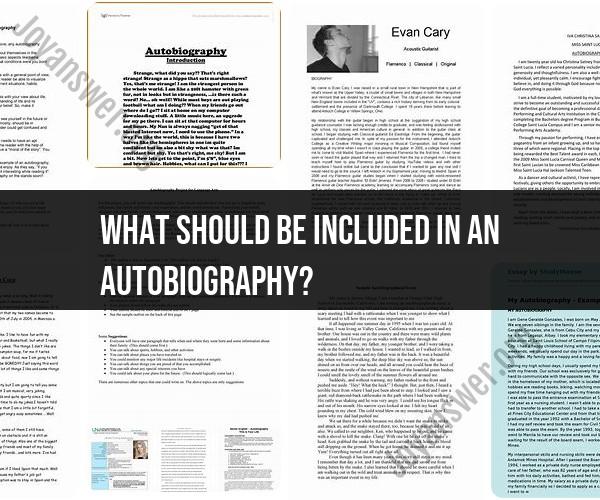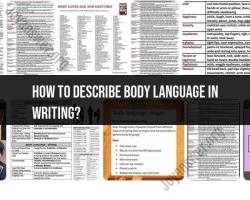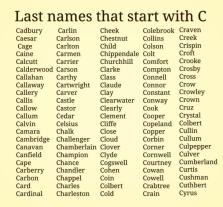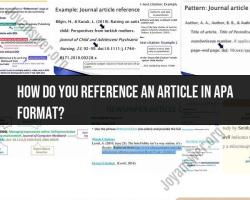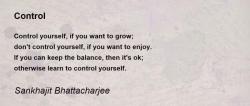What should be included in an autobiography?
Writing an autobiography is a deeply personal endeavor, and its content can vary widely depending on your life experiences, preferences, and the purpose of your autobiography. However, there are some key elements and considerations to keep in mind when composing an autobiography:
Personal Background:
- Start with an introduction that includes your name, birthdate, and birthplace.
- Mention your family background, including parents, siblings, and early upbringing.
Significant Life Events:
- Highlight major events and milestones in your life, such as childhood memories, educational achievements, career developments, and significant relationships.
Challenges and Struggles:
- Discuss obstacles, challenges, and hardships you've faced. This could include personal difficulties, health issues, or adversity in your professional or personal life.
Achievements and Successes:
- Celebrate your accomplishments and successes, whether they are academic, professional, personal, or creative.
Relationships:
- Describe the key people in your life, such as family members, friends, mentors, and romantic partners. Explain how they have influenced you.
Personal Growth and Transformation:
- Reflect on personal growth and the lessons you've learned throughout your life. Discuss how you've changed and evolved as a person.
Passions and Interests:
- Share your hobbies, interests, and passions, such as sports, art, music, literature, or any other activities that have played a significant role in your life.
Values and Beliefs:
- Discuss your core values, beliefs, and principles, including any ethical, spiritual, or philosophical perspectives that have shaped your worldview.
Anecdotes and Stories:
- Include interesting anecdotes, stories, and experiences that provide insight into your character and life journey.
Reflections:
- Offer reflections on your life experiences, addressing what you've learned, your regrets, and your hopes for the future.
- Writing Style:
- Choose a writing style that suits your personality and story. It can be formal, informal, humorous, or poetic, depending on your voice and intentions.
- Themes and Motifs:
- Consider incorporating recurring themes or motifs that run through your life story, providing cohesion and depth to your autobiography.
- Impact on Others:
- Reflect on the impact you've had on others and the mark you hope to leave on the world.
- Conclusion:
- Wrap up your autobiography with a conclusion that summarizes your journey and leaves readers with a lasting impression.
- Honesty and Authenticity:
- Be honest and authentic in your storytelling. Readers appreciate sincerity and candidness in autobiographies.
- Proofreading and Editing:
- Ensure your autobiography is well-edited and proofread to eliminate grammatical errors and improve clarity.
Remember that there is no one-size-fits-all approach to writing an autobiography. You have the creative freedom to shape your life story in a way that feels most authentic and meaningful to you. Tailor your autobiography to your audience and purpose, whether it's for personal reflection, sharing with family and friends, or publication for a broader readership.
What to Include in Your Autobiography: A Comprehensive Checklist
An autobiography is a story of your life, written by you. It is a chance to share your experiences, insights, and wisdom with the world. There is no one right way to write an autobiography, but there are some things that you may want to consider including:
- Your early life: Where were you born? What was your family like? What are some of your earliest memories?
- Your education: What schools did you attend? What subjects were you interested in? What were some of your most memorable experiences?
- Your career: What jobs have you had? What are you most proud of accomplishing in your career? What challenges have you faced?
- Your relationships: Who are the most important people in your life? What have you learned from your relationships?
- Your values and beliefs: What is important to you? What have you learned about life over the years?
In addition to these general topics, you may also want to include specific stories and anecdotes that capture the essence of your life. For example, you could write about a time when you overcame a challenge, learned a valuable lesson, or experienced something truly extraordinary.
Structuring Your Autobiography for Maximum Impact
There is no one right way to structure your autobiography, but there are a few things that you can do to make it more engaging and impactful.
- Start with a strong introduction. Your introduction should grab the reader's attention and make them want to keep reading. You could start with a compelling story, a thought-provoking question, or a powerful statement.
- Organize your autobiography chronologically or thematically. Chronological organization is the most common way to structure an autobiography, but you could also organize your autobiography thematically, focusing on different aspects of your life, such as your career, relationships, or values.
- Use vivid language and imagery. The best autobiographies are written in a clear and engaging style. Use vivid language and imagery to bring your story to life.
- Be honest and authentic. An autobiography is a chance to share your true self with the world. Be honest about your experiences, both good and bad.
Capturing the Essence of Your Life in an Autobiography
Writing an autobiography can be a challenging but rewarding experience. It is a chance to reflect on your life, learn from your experiences, and share your story with the world.
Here are a few tips for capturing the essence of your life in your autobiography:
- Write from the heart. Don't worry about being perfect. Just focus on writing from the heart and sharing your story in your own words.
- Be specific. Don't just tell the reader what happened. Show them. Use specific examples and anecdotes to illustrate your points.
- Be honest. An autobiography is a chance to share your true self with the world. Be honest about your experiences, both good and bad.
- Be reflective. Don't just tell the reader what happened. Reflect on your experiences and share what you learned from them.
Writing an autobiography can be a life-changing experience. It is a chance to learn more about yourself, to share your story with the world, and to leave a lasting legacy.
